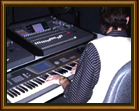I began by totally covering my studio walls with concept sketches from the Quest for Glory V art team. Next, I spent hours and hours with Lori Cole and Terry Robinson - picking their brains about the why's, who's, and how's behind every drawing. Finally, as I began to FEEL things about the story, the characters, the places, and so on, the music began to come out.
 I started with a handful of musical sketches - rough arrangements done on
synthesizers - and put them out on our Quest for Glory V website. Then, I invited
the fans of the series to listen to them and give me their feedback. It was a bold move,
to put something so raw out there. But people responded like crazy. I received hundreds of
e-mails, and surprisingly, most were very positive.
I started with a handful of musical sketches - rough arrangements done on
synthesizers - and put them out on our Quest for Glory V website. Then, I invited
the fans of the series to listen to them and give me their feedback. It was a bold move,
to put something so raw out there. But people responded like crazy. I received hundreds of
e-mails, and surprisingly, most were very positive.
But there was one area where I totally missed the boat, and the fans let me know about it, in no uncertain terms. My Quest for Glory V overture was not what the fans wanted, nor expected. This was primarily because I left out the traditional Quest for Glory theme. I had always planned to include the theme later in the game, but I wanted to write my own overture. The fans would have none of that self-serving nonsense! They wanted their theme in the overture, and that was all there was to it. Some of them were very explicit about it. So I re-wrote the overture, included the original theme, and sent a copy to a select group of the toughest, most critical respondents. Every single one of them wrote back to me and expressed their approbation for the new overture. When that happened, I figured it was OK to keep it.